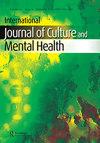韩国的心理健康素养
Q1 Social Sciences
International Journal of Culture and Mental Health
Pub Date : 2017-05-30
DOI:10.1080/17542863.2017.1322623
引用次数: 8
摘要
本研究旨在调查韩国公众对精神障碍的认知、对精神障碍的态度以及对精神障碍专业或自助的认识和信念。总共有253名参与者看到了描述神经性贪食症、双相情感障碍、物质成瘾、抑郁症、精神分裂症、强迫症、注意力缺陷多动障碍、厌食症和社交恐惧症的案例插图。参与者被要求在小插曲中识别出所描述的精神障碍,对每个角色适应精神问题的能力进行评分,并对每个角色提供几种帮助的可能性进行评分。参与者注意到他们以前的精神障碍病史。其中物质成瘾最多(80.2%),厌食症最少(10.7%)。参加者回答说,心理学家/精神科医生的帮助是最有用的。在9种精神障碍中,6种精神障碍的识别被本研究所包含的变量显著预测,其中较高的教育水平是对精神障碍高识别的最显著预测因子。与其他国家相比,韩国人对精神障碍的识别能力比英国人差,即使文化相似,韩国与其他亚洲国家在精神障碍的识别能力上也存在差异。我们认识到本研究的局限性。本文章由计算机程序翻译,如有差异,请以英文原文为准。
Mental health literacy in South Korea
ABSTRACT The study aimed to examine the Korean public’s recognition of mental disorders, attitudes towards mental disorders and knowledge and beliefs about professional or self-help for mental disorders. In all, 253 participants were presented with case vignettes describing bulimia nervosa, bipolar disorder, substance addiction, depression, schizophrenia, obsessive compulsive disorder, attention deficit hyperactivity disorder, anorexia and social phobia. Participants were asked to identify described mental disorders in the vignettes, to rate each character’s adjustment to live with the mental problems and to rate the likelihood of suggesting several types of help for each character. Participants noted their previous history of exposure to mental disorders. Substance addiction was recognized the most (80.2%) and anorexia the least (10.7%). Participants responded that a psychologist/psychiatrist’s help would be the most useful. Of the nine mental disorders, the recognition of six mental disorders was significantly predicted by the variables included in this study, and amongst the factors, higher level of education was found to be the most significant predictor for high recognition of mental disorders. Compared to other countries, the ability of Koreans to recognize mental disorders was poorer than that of British, and there was a difference between South Korean and other Asian countries in terms of ability to recognize mental disorders even if they shared a similar culture. Limitations of this study were recognized.
求助全文
通过发布文献求助,成功后即可免费获取论文全文。
去求助
来源期刊

International Journal of Culture and Mental Health
Social Sciences-Cultural Studies
CiteScore
2.10
自引率
0.00%
发文量
0
期刊介绍:
This title has ceased (2018). This important peer-review journal provides an innovative forum, both international and multidisciplinary, for addressing cross-cultural issues and mental health. Culture as it comes to bear on mental health is a rapidly expanding area of inquiry and research within psychiatry and psychology, and other related fields such as social work, with important implications for practice in the global context. The journal is an essential resource for health care professionals working in the field of cross-cultural mental health.Readership includes psychiatrists, psychologists, medical anthropologists, medical sociologists, psychiatric nurses and social workers, general practitioners and other mental health professionals interested in the area. The International Journal of Culture and Mental Health publishes original empirical research, review papers and theoretical articles in the fields of cross-cultural psychiatry and psychology. Contributions from the fields of medical anthropology and medical sociology are particularly welcome. A continuing dialogue between members of various disciplines in various fields is encouraged. The aim of the journal is to encourage its readers to think about various issues which have clouded cross-cultural development of ideas. The journal lays special emphasis on developing further links between medical anthropology, medical sociology, clinical psychiatry and psychology, and implications of the findings on service provisions. The journal is published four times a year. The style of reference is Harvard. All research articles in this journal, including those in special issues, special sections or supplements, have undergone rigorous peer review, based on initial editor screening and anonymized refereeing by at least two independent referees.
 求助内容:
求助内容: 应助结果提醒方式:
应助结果提醒方式:


